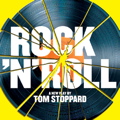
Playing to full houses at the Duke of York's Theatre in London, Tom Stoppar's latest play, Rock 'N' Roll lays out a theory of art as well as a political story line. Basically the play suggests that art -- in this case the music of classic rock 'n' roll -- thrives on a deeper level in countries that censor it (like those behind the Iron Curtain prior to the fall of Soviet Communism).
Now, this is not a new vision; there was a good deal of talk in the 1970s and '80s about how literature, particularly poetry and fiction, held a much more sacred and significant place where it was censored. American poets envied their Russian peers, who lived in a place where a poetry performance might be a major cultural event, where people actually lined up to hear poets read their work and sometimes smuggled banned books across borders for friends.
Stoppard's contribution to this insight is suggesting that rock music in particular was a rallying cry of freedom and self-expression for youths behind the Iron Curtain, which in this play are those in Czechoslovakia. One could be arrested for having certain records in one’s possession; rock concerts might be held in secret places to avoid the police. Forbidden fruit is sweetest. But beyond that, Stoppard implies that the lyrics and music of rock uniquely speak to the revolutionary soul. The sometimes too ambitious story line involves a Communist professor, Max (well played by David Calder), at Cambridge in 1968 who befriends a Czech student, Jan, presumably a fellow Communist. But Jan makes clear to him, "No Czech is a Communist," probably an overstatement but one that reveals the level of disaffection among artists and intellectuals there. So the tension between these two men, spanning the length of the play, and covering the years 1968 to 1990 (several years after the fall of the Berlin Wall) is both friendly and revealing of cultural attitudes in the two places: the free West and the politically subdued Eastern Europe. Max can be the most puffed up and outrageous Marxist quite without consequence in England, while Jan is subject to all kinds of coercion once he returns home with a suitcase full of classic rock records of the day. Jan has no desire to be political, but is forced into involvement by the treatment he and his free-thinking friends receive under the harsh Communist regime, including time in prison.
The play, directed efficiently by Trevor Nunn, is broken into numerous short scenes in two acts, moving forward chronologically, as well as back and forth between Czechoslovakia and England. Each scene is capped with a rock song played while a gray screen covers the stage, giving artist, song title, date, and players on the record. The audience becomes increasingly involved in the rock arcana so prized by Jan and his friend Ferdinand.
At first this schema seems artificial and imposed, but as the play continues, the music more and more informs the mood of the times and the themes of the era. Jan's suffering is captured beautifully by the actor Rufus Sewell in both his commitment to rock as a record collector and his increasingly difficult life under communism. Early on after his return he was a journalist, and, as he tells Max, "I was an optimist for nine months," enjoying being a newspaper columnist before he got purged. He jokes that he couldn't emigrate to Germany because the German rock bands were so bad. Jan has become totally enamored of The Plastic People of the Universe, a Czech band who sang their lyrics in English and galvanized the youth of Prague.
And he continues through the next several decades to be a fan of Syd Barrett, the Rolling Stones, the Beach Boys, and most particularly the band Barrett co-founded, Pink Floyd. For the Czech activists, this music is the expression of their inner lives, of all that they must hide in public, and even of their resistance to the police state. One of the most painful moments in the play is when Jan returns from some months in prison to discover that the secret police have trashed his apartment and broken all of his records. His despair at that moment is absolute. For me, these scenes in Prague are where the heart of the play lies. The Cambridge scenes have less emotional power. But Stoppard also overfills them with themes and complications involving family life, breast cancer, feminist literary theory, sexual jealousy, divorce, parental expectations, spying and political betrayal, Barrett's long mental decline, and more. It becomes too much.
The play can't sustain so many threads, and the ending is rather sentimental. Nonetheless, one leaves the theatre moved by just how powerfully rock did communicate a refusal to give in to the powers that be. And when in the final scenes the characters talk excitedly about Mick Jagger and the Rolling Stones playing their historic 1990 concert in Prague, it seems, at least for that moment, to be a magnificent victory for freedom and music.
Rock 'N' Roll is playing at Duke of York's Theatre, St. Martin's Lane, London WC2; it is currently scheduled to run through February 25, 2007. Plastic People of the Universe has reunited (despite the 2001 death of leader Milan Hlavsa) in the wake of renewed interest sparked by Stoppard's play. The band is playing two concerts in New York City, November 11 at the Cutting Room (presented by the Harriman Institute of Columbia University) and November 13 at the Knitting Factory, as well as four concerts in Europe.
